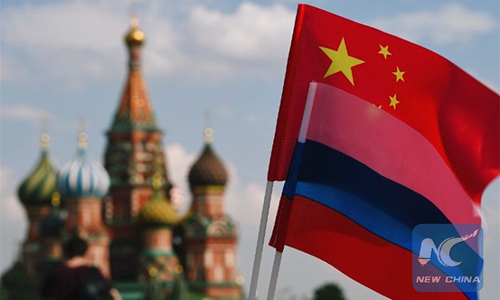China-Russia rail bridge finishes tracklaying work, will boost bilateral trade
Project will boost bilateral economic, trade exchanges

China-Russia Photo: Xinhua
The tracklaying work for the first China-Russia railway bridge was completed on Tuesday and the project is set for a test run later in the month before initial operation by the year's end, marking a major step forward in construction of the crucial infrastructure facility between the two countries.
Coming at a time when bilateral relations between China and Russia are expanding rapidly, the Tongjiang-Nizhneleninskoye railway bridge will play an important role in further enhancing economic and trade exchanges between the two countries, experts said.
The 7,194-meter bridge connects the two neighbors across the Heilongjiang River, also known as the Amur River in Russia, linking the city of Tongjiang in Northeast China's Heilongjiang Province with Nizhneleninskoye in Russia.
"There will be a Russian train coming over to the Chinese side in the second half of August as a test to see if everything is fine," Lin Yonghan, a project manager at the bridge, told the Global Times on Tuesday.
It has been reported that the bridge will be open to traffic this year and become fully operational in 2022.
The opening of the bridge will make Tongjiang the fourth border crossing between China and Russia, as it will connect China's rail system with the railway network in Russia's Far East. It will shorten the rail trip between Heilongjiang and Moscow by 809 kilometers and save 10 hours, compared with the trip through the Suifenhe border crossing.
The completion of the bridge is a milestone as the first railway bridge between the two countries, and it will greatly expand the scale of bilateral trade and cooperation between the far eastern part of Russia and Northeast China, said Song Kui, president of the Contemporary China-Russia Regional Economy Research Institute.
"It will deepen the economic link between the two countries, optimize production and facilitate industrial cooperation," Song told the Global Times on Tuesday.
As a major aspect of China-Russia cooperation, the rail bridge will specifically boost energy and resources cooperation between the two countries, experts said.
For example, rich non-ferrous mineral resources from Russia can be transported to Northeast China for processing at a relatively low transportation cost, Song said.
Iron ore will be the main product carried across the span, which has an annual designed cargo capacity of 21 million tons, according to Lin.
The bridge will also serve as an important channel for bilateral energy cooperation, Lin Boqiang, director of the China Center for Energy Economics Research at Xiamen University, told the Global Times on Tuesday.
"Since China and Russia share a border, China will have greater security when importing oil and gas from Russia, compared with [other shipping options]," Lin said.
Progress in bilateral cooperation has also been made in the field of chemical industry infrastructure.
Earlier this month, China Railway Construction Corp signed a contract with Russia's Irkutsk Oil Co for the first phase of construction for a chemical plant in Russia, with a contract value of about 614 million yuan ($94.74 million). The project will reportedly create more than 3,000 local jobs and provide 650,000 tons of polyethylene products per year to help the local petrochemical industry.
China-Russia trade exceeded $100 billion for three consecutive years as of 2020, according to China's Ministry of Commerce. In the first seven months of 2021, bilateral trade hit $75.49 billion, up 28 percent year-on-year, according to Chinese customs data.
"The bridge will greatly lift the trade scale between the two countries," Song said, adding that the two countries also have great prospects for cooperation in new-energy vehicles, coal and mineral resources, agriculture and food processing, and aerospace.
